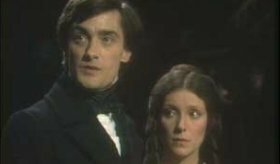|
|
| Tookey's Review |
|
| Pro Reviews |
|
| Mixed Reviews |
|
| Anti Reviews |
|
| Cast |
|
| |
 |
| |
| Released: |
1982 |
| |
|
| Genre: |
DRAMA
RITES-OF-PASSAGE
COSTUME
FAMILY
COMEDY
|
| |
|
| Origin: |
GB |
| |
|
| Colour: |
C |
| |
|
| Length: |
540 |
|
| |
|
| |
|
|
| |
|
|
A young man (Roger Rees) makes his way in Victorian England.
|
Reviewed by Chris Tookey
|
|
I saw the nine-hour theatrical version of this three times, and I’ve sat through this small-screen rendition of it twice. It ranks among the finest stage productions I have ever seen, and it captures everything that’s great about my favourite author, Charles Dickens - his richness, humanity, humour, vitality, mastery of dialogue and description, and the sheer range of his vision. It’s sobering to think he published it when he was only 28 (and started it when he was 26). This is pretty much the whole book presented, as Ruskin put it when he described Dickens’ writing, “in a circle of stage fire”.
|
|
The original Royal Shakespeare Company production at the Aldwych Theatre, London, was far from a guaranteed success when I saw it - initially, in preview. The critics were gunning for it because it was not Shakespeare and a number of them disapproved of adaptations in principle (among them the Guardian’s influential Michael Billington). The first reviews were shamefully unappreciative, and it was only the warmth of the audience reaction and a perceptive article about it in the Times by Bernard Levin that turned it into arguably the greatest commercial (and, in the end, critical) stage success of the 1980s.
|
|
"Not for so many years,” wrote Levin, “has London's theatre seen anything so richly joyous, so immoderately rife with pleasure, drama, colour and entertainment, so life enhancing, - in one word which embraces all these and more - so Dickensian. It is a celebration of love and justice that is true to the spirit of Dickens' belief that those are the fulcrums on which the universe is moved, and the consequence is that we come out not merely delighted but strengthened, not just entertained but uplifted, not only affected but changed."
|
|
The production went on to be a theatrical sensation in London and on Broadway.
|
|
The production happened only because of a subsidy cut, which meant that the RSC could not present its customary three or four new productions at the Aldwych Theatre, its London home. The company’s artistic director, Trevor Nunn, decided to take this opportunity to stage, as he put it, ‘an intractable and labyrinthine and tentacular and epic work’.
|
|
Though the script is credited to David Edgar, really the piece emerged from 48 actors in a room with no script (there are just 42 actors in this screen version, to play upwards of 250 parts). Edgar compiled the script in much the same way as Mike Leigh creates his - from actors’ improvisations. Trevor Nunn (and, to a lesser extent, John Caird) contributed enormously to the writing, as well as the staging. All the performances are heartfelt and many are sensational, none more so than David Threlfall, who transforms himself astonishingly into Smike, and Roger Rees, who powers his way through the show in an engaging way that takes the curse off Nicholas’s occasional pomposities and priggishness.
|
|
Everyone should see this version, even though it is distinctly theatrical. In some ways, it even improves on the novel. The inspired zaniness of the Crummles production of Romeo and Juliet, complete with happy ending, uses Dickens only as the starting point. It is hilarious and touching in its own right, but also has plenty to say about the way adapters try to bowdlerise the classics.
|
|
Here is one classic that hasn’t been bowdlerised. It may not, strictly speaking, be cinematic, but it is the finest screen version of Dickens available. Even David Lean’s superb but extremely pared-down version of Great Expectations was less faithful to the book. Here is one of those rarities - a genuinely life-enhancing experience, and one that no lover of first-rate art or entertainment should miss.
|
|
|
|
|
